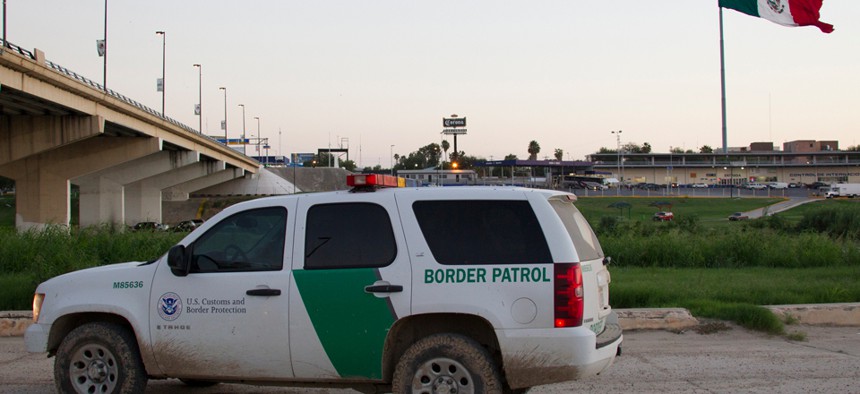
A CBP vehicle stands in Laredo, Texas, looking into Nuevo Laredo, Mexico in September. United States Customs and Border Protection
Five Agencies Stand to Gain from Obama Request for New Border Funds
$3.7 billion supplemental called 'whole of government' response to influx of children.
This story has been updated.
Following a shift in tone toward greater use of deportations, President Obama on Tuesday sent Congress a $3.7 billion supplemental appropriations request that would bolster efforts by five agencies to address the Southwestern border crisis caused by the arrival of thousands of unaccompanied minors from Central America.
“The administration continues to address this urgent humanitarian situation with a whole-of government response which includes efforts by the departments of Homeland Security and Justice to deploy additional enforcement resources -- including immigration judges, Immigration and Customs Enforcement attorneys, and asylum officers,” White House aides said in a fact sheet as the request was sent up to Capitol Hill.
“The administration also continues to work closely with our Mexican and Central American partners to address the root causes of this problem, stem the flow of adults and unaccompanied children into the United States, and expand capacity to receive and reintegrate repatriated migrants,” the statement noted.
Obama in recent weeks has reaped severe criticism from border-state officials who say his response to the influx has been weak and chaotic, as well as from pro-immigration groups who oppose deportations as contrary to humanitarian values.
The $3.7 billion in emergency funds would be allocated according to the themes of increased deterrence and “removal of adults with children,” along with enhanced capacity of immigration courts to accelerate case processing. Intensified enforcement would block and prosecute networks responsible for attracting and trafficking the Central American children, according to the plan. The funds would also help step up cooperation with foreign governments on repatriation and reintegration of migrating people, partly through new information efforts.
Funds would also go toward increased detention, care and transport of unaccompanied children, the White House said, noting recent high-level diplomatic meetings conducted by Vice President Joe Biden and Secretary of State John Kerry. “While the administration is working across all of these channels, we are eager to work with the Congress to ensure that sufficient resources and authorities exist to continue our efforts,” the White House said.
The plan loops in two agencies within Homeland Security along with the Justice, State and Health and Human Services departments.
Immigration and Customs Enforcement would receive $1.1 billion to pay for transportation costs of apprehended children and expanded investigatory and customs enforcement efforts in El Salvador, Guatemala, and Honduras. The bulk of ICE’s supplemental budget, $879 million, would go to detention, removal and prosecution of “adults with children who cross the border unlawfully.”
Customs and Border Protection would receive $433 million for air surveillance and other operational costs of responding to the influx, including overtime and temporary duty costs and child care and medical care for the new arrivals.
Justice would receive $64 million to hire temporary immigration judges and to provide legal orientation to arrivals.
State and other international agencies would receive $300 million for repatriation efforts and media campaigns inside Mexico and Central American countries.
Health and Human Services would receive the largest portion -- $1.8 billion -- “to provide the appropriate care for unaccompanied children, consistent with federal law, while maintaining services for refugees,” including shelter capacity. Under a 2008 law, most unaccompanied minors apprehended by the Border Patrol must be handed over to HHS.
Initial reaction on Capitol Hill to the proposal—to which the White House added $615 million to combat wildfires—was mixed. House Appropriations Committee Chairman Hal Rogers, R-Ky., issued a statement saying, “In the next few days and weeks, my committee will take a close and a thorough look at this funding request, and as per the normal congressional process, will make our own determination on how to appropriately and wisely use taxpayer resources. “Plainly, the situation for many of these unaccompanied children is extremely dire, and the United States has both a security and a moral obligation to help solve the crisis at hand."
House Judiciary Committee Chairman Bob Goodlatte, R-Va., was more negative. “President Obama created this disaster at our southern border and now he is asking to use billions of taxpayer dollars without accountability or a plan in place to actually stop the border crisis," Goodlatte stated. "Most of the money requested in the president’s supplemental seems geared towards processing Central Americans rather than stopping the surge itself. It’s clear that law enforcement officers at the border need more resources to deal with the border crisis but resources will only be useful if there are consequences for illegal immigration.”
Goodlatte stressed that Republicans are committed to solving the border problem, including changing current law. But, he added, “No amount of resources or changes will be effective in stemming the surge of illegal border crossings if President Obama continues to ignore the law. [He] has many tools at his disposal now to quell this activity at our southern border, such as enforcing immigration laws and cracking down on rampant asylum fraud. Unfortunately, none of these tools are mentioned in his proposal.”
At least one pro-immigration group criticized Obama’s plan before its release. “Congress must reject the administration’s plans to almost precipitously deport children without giving them a fair day in court and meaningful due process,” said Marielena Hincapié, executive director of the National Immigration Law Center. “The politics of fear in the immigration debate is always uncalled-for, but especially when we are talking about deporting children who deserve our protection.”







